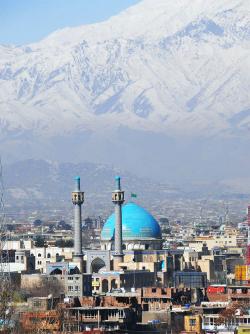China, Democracy, and Christianity
The rise of China and the future of the West are imminent concerns for many, but what do history and the Bible tell us about the destinies of both?
Western democracies took notice in July of this year when 24-year-old Hong Kong restaurant worker Tong Ying-Kit was convicted of terrorism and inciting secession, receiving a nine-year prison sentence—the first such sentence issued under a new law forced on the semiautonomous region by its Chinese rulers. Tong had crashed his motorcycle, bearing a flag with the phrase “Liberate Hong Kong, revolution of our times” into a crowd of police officers.
For most of the past 2,000 years, China was the wealthiest nation on earth. It gave the world great inventions, such as paper, the printing press, the magnetic compass, and gunpowder—yet Westerners, especially in the nineteenth and twentieth centuries, viewed China as unworthy of respect. And China opposed as often as admired Western ideas of democracy and free speech. So, what can we learn from Scripture and history to help us better understand China?
The Bible speaks of China in terms of the peoples descended from Magog, a son of Japheth who was in turn a son of Noah. Many Bible students are familiar with the prophesied 200-million-man army marching from the east across the Euphrates River (Revelation 9:14–16), and very naturally associate that army with China, so it may be interesting to note that nothing in your Bible specifically depicts China taking up arms against the modern descendants of ancient Israel before Jesus Christ’s return.
So, why has the West held such a decidedly negative view of China? And how does China view the Western nations? Can we understand what is behind this important nation’s distrust of Western actions and values?
China and Britain—A Troubled Past
China fought against Great Britain in the first Opium War from 1839 to 1842, with France joining the fight against China in the Second Opium War from 1856 to 1860. These wars led to a defeated China ceding the territory of Hong Kong to Britain and opening formerly closed Chinese ports to Western traffic. Additionally, foreigners in China would be subject to their home country’s law, not to Chinese law.
Because of these concessions, Chinese authorities could not intervene as British merchants sold massive quantities of opium, produced in British India, to tens of thousands of Chinese, who became hopelessly addicted. Britain ignored the pleas from the Chinese authorities to cease this trade (Jack Hayes, “The Opium Wars in China,” AsiaPacificCurriculum.ca).
Some scholars assert that the Opium Wars were caused by China’s harsh treatment of foreigners, but even if that were the case, it is very hard to justify the sales of addictive drugs that were illegal in England. Certainly, China had a challenging relationship with Western nations and their values.
We see this as well in the Taiping Rebellion, which rose up between the first and second Opium Wars. In 1837, 23-year-old Hong Xiuquan fell ill, and in the course of the illness believed the God of Heaven had appeared to him in vision, giving messages of a true way of life. Hong was also influenced by an American Southern Baptist missionary and began a study of the Bible. Eventually, he and Feng Yunshan, a disciple who led a group called “the God Worshippers,” joined forces and their ideas spread.
Hong sought to create a new government in China, a theocracy with him at the head. His movement was strengthened by a growing sense, especially among indigenous Han Chinese, that the Manchuria-based Qing Empire—which had overturned the mighty Ming Dynasty in 1644 to become only the second foreign force ruling China—had outlived its usefulness, especially given the disastrous results of the First Opium War. Though the Qing Empire united Manchu and Han, and even some Mongols, most in China saw the Qing as an outside oppressor—albeit far less foreign than the British.
Hong’s movement grew large, gaining millions of followers in a very short time. By 1849, it had expanded into several regions of China, soon entering a new phase with open warfare against the Qing. Hong claimed that his brother, Jesus, had told him to establish the Taiping Heavenly Kingdom on earth. “In 1850, alleging that Jesus had urged Hong to ‘fight for Heaven,’ Hong began to arm his followers. Soon, the God Worshippers were buying gunpowder in bulk and becoming organized by military rankings” (“Taiping Rebellion,” History.com, August 21, 2018).
Hong’s followers formed remarkably well-disciplined units of soldiers, both men’s and women’s divisions, and by 1852 had seized the southern Qing capital of Nanjing. The Qing were clearly in trouble. Western countries were seemingly watching the result and at times supporting both sides, hoping to be able to grab complete control of the country themselves. Then, in 1856, the Second Opium War broke out, and Hong expected that the Western forces would come to his aid. In the end, after the Qing agreed to terms, British Major-General Charles Gordon assisted the Qing in crushing the Taiping in 1864. The price to China was horrific. Estimates vary, but the Taiping Rebellion is believed to have claimed between 20 million and 70 million lives, making it one of the deadliest conflicts in human history (History.com).
China was devastated, the Qing Empire in tatters with a ruined economy beset by poverty and famine as a result of war, and the land under the control of local warlords. Is it any wonder that so many in China today fear uncontrolled Western influence? And for those who might be tempted toward sympathy for Hong and his professed love for the Bible and God’s law (including the seventh-day Sabbath), let us not forget that the very premise behind his rebellion showed his deep ignorance of the attitude Scripture tells Christians to have regarding their nations’ politics:
Let every soul be subject to the governing authorities. For there is no authority except from God, and the authorities that exist are appointed by God. Therefore whoever resists the authority resists the ordinance of God, and those who resist will bring judgment on themselves…. Therefore you must be subject, not only because of wrath but also for conscience’ sake (Romans 13:1–2, 5).
Once a Mighty Empire
When speaking of the last 200 years of Chinese history, few in the West bother to consider thousands of years of Chinese civilization before they presume to make judgments or set policies regarding the ancient nation.
When Portuguese explorer Fernão Peres de Andrade in 1517 entered the southern Chinese port of Guangzhou, he could see that his eight weather-worn ships were tiny compared to the grand vessels of the Ming fleet. One observer recorded his impressions:
The ramparts were covered in silken banners, while on the towers reared flagstaffs from which also hung silken flags, so huge that they could be used as sails.… Such is the wealth of that country, such is its vast supply of silk, that they squander gold leaf and silk on these flags where we use cheap colors and coarse linen cloth (“China Has Dominated the West Before,” The Atlantic, June 6, 2020).
What Andrade and his crews did not know is that, for most of the time between the unification of China under Emperor Qin (c. 250 BC) and their visit to Guangzhou, China had the world’s biggest GDP and was the wealthiest, most organized, and most advanced society on the planet. Dynasties such as the Han (206 BC–220 AD), Tang (618–907 AD), Song (960–1279 AD), and Ming (1368–1644 AD) ruled a vast empire often encompassing more territory than present-day China. The limited interaction between Europe and China from the days of Rome had not been firsthand, but largely a matter of trade carried out indirectly through middlemen from central Asia and the Arabic world.
Marco Polo visited China between 1271 and 1295 AD, becoming a close associate of the ruling classes at the time. However, he saw the nation during a phase when it had been conquered by a foreign people, the Mongols—originally led by Kublai Khan—who established their rule under the Yuan Dynasty (1259–1368 AD). The Chinese always viewed the Yuan as foreigners and finally expelled them in 1368 AD. The wealthy and powerful Ming period followed, but most of that wealth remained in the region as China largely turned inward during the years when the British Empire was expanding across the globe.
China’s Troubled Turn Westward
A century ago, China played a small but significant role aiding the Allied powers during World War I, but those efforts were largely ignored afterward. Nevertheless, having engaged with the West, it is no surprise that a range of Western ideas took root in China—including the communist ideology developed a century earlier by German philosopher Karl Marx. Following the horrific Japanese attack on Manchuria in 1931, much of China’s population rallied around Mao Zedong, leader of the Communist Party of China, whom they saw as the leader in the fight against Japan. Eventually, nationalist Chinese forces retreated to the island of Taiwan and Mao took the reins of power, ruling with a Western ideology that during the Cultural Revolution of the 1960s went so far as to forbid the study of ancient Chinese philosophers like Confucius.
Some may find it ironic that a nation so distrustful of foreign influences took so readily to the European idea of Marxism. It is significant that, shortly after the death of Mao Zedong, the Communist Party of China adopted a framework it called “socialism with Chinese characteristics.” After Mao’s death in 1976, Deng Xiaoping took the helm of the People’s Republic of China. He had the task of taking a country that had endured a century and a half of strife, war, famine, and questionable leadership, with a broken economy, a ruined education system, and a nearly destitute population, and bringing it into the modern world. Despite the opinions one may have of China today, the change has been faster and greater in magnitude than any other nation in recorded history has ever achieved. The scale and magnitude of this transformation, especially given China’s massive population, is essentially unparalleled in human history.
And this brings us to the present day. Chinese leaders have seen firsthand the allure of Western ideas—as well as the damage Western ideas have brought to their nation. Yet they also want to bring prosperity to their people and to regain the power, influence, and respect their nation once had.
Jesus Christ brought Christianity to a Roman Empire where democracy was reviled, yet He never counseled rebellion. He knew that no government other than the Kingdom of God would suffice for our troubled world—and that only He, as its King, could bring to our world the peace and prosperity it so desperately needs. We pray for all who are now oppressed, yet as Christians our ultimate plea should not be “Liberate my country,” but, rather, “Your Kingdom come!”






